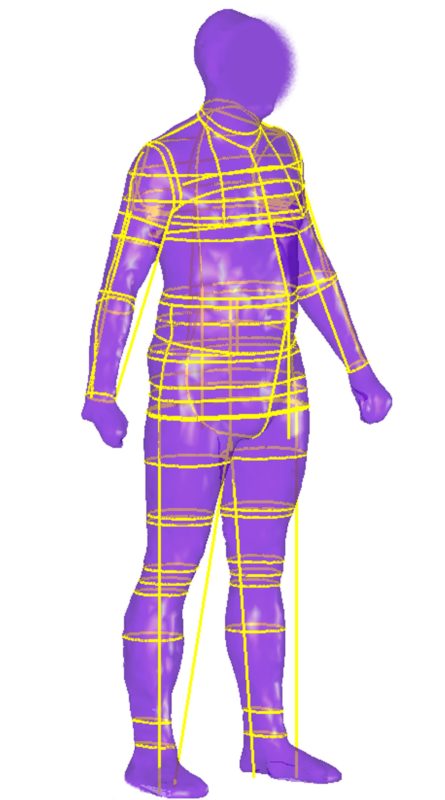Whole-body scanning can change men’s body image

*** Reposted with permission from Manchester Metropolitan University***
Study recommends more support when scanning used by retailers
Whole-body scanning can change men’s body image, and while it may help them adopt a more healthy lifestyle, care should be taken about how the technology is used in public, according to a new study.
Researchers at Manchester Metropolitan University and the University of Manchester reveal that many men were shocked and disappointed with their appearance after seeing a whole body scanned image of themselves.
The study, published in Psychology and Health, recorded interviews with men before and after looking at their scans, which create a 3D silhouette of the body.
Increased body concerns
Dr Sarah Grogan, lead researcher and Professor of Psychology at Manchester Metropolitan University, said: “Body scanning has been used by those in fashion and clothing design for many years and is a very valuable tool in the industry for things, such as made to measure clothing and size guidance, but it has recently entered the mainstream and become widely accessible to the general public. Some UK supermarkets now offer whole-body scanning facilities for clothes fitting, so it’s important to see what impact this has on men’s body image.
“All men said they were generally happy with how they looked before the scanning took place, but after the scan men reported looking shorter, fatter, thinner, and less symmetrical than they had hoped. These increased body concerns highlight potential dangers and suggest that if whole-body scanning is used in supermarkets and other public places, it needs to be administered with careful supervision.”
Pre-scan, all men expressed their ideal body shape as slender, tall, and relatively muscular – all characteristics that reflect societal ideals for men’s bodies.
Participant David said: “The more muscly well-built tall men are generally seen as more attractive.”
However, all men were generally “happy” with their body.
Post-scan, comments included, “I look like a sausage”, “I feel like I look shorter” and another complained that his “left shoulder slopes down a bit”.
Most of the men who participated in the study reported that seeing their scan was the motivation they needed to start a healthy lifestyle, and that the scan was “a very good wakeup call”. But all of them men said that others might find the scanner experience challenging.
Dr Grogan said: “Findings suggest that some men may find body scanning helpful in motivating exercise. However, further work is needed to understand how body scanning should be delivered in these kinds of public contexts to avoid potential harm. This is particularly urgent given that men can currently access whole-body scans in clothes retailers with no support at all, which could leave vulnerable men less body-satisfied and ultimately more likely to engage in unhealthy behaviours.”
Please note that this article will be available and free to view from 08 January at this link: https://tandfonline.com/doi/full/10.1080/08870446.2018.1549326
About Manchester Metropolitan University
Manchester Metropolitan University is one of the most extensive higher education centres in Europe with 38,000 students and more than 1,000 undergraduate, postgraduate and professional courses. The University educates and trains large numbers of legal and business professionals, scientists, engineers, teachers, health workers and creative professionals.
Manchester Metropolitan achieved the silver award in the Teaching Excellence Framework, has 85% of research impact rated world-leading and internationally excellent as judged in the REF, is the UK’s greenest university as ranked by the People and Planet sustainability league tables and is one of the country’s top 20 best employers for LGBT staff, as featured in the Stonewall Top 100 Employers ranking.
The University is in the top 200 global universities under 50 years old as ranked by the Times Higher Education and has more than 290,000 alumni living across the world, with a further 10,000 new graduates joining the community each year. Notable alumni include fashion designer Sarah Burton, actor Julie Walters, designer Thomas Heatherwick and marketing expert Jonathan Mildenhall.
News – https://www2.mmu.ac.uk/news-and-events/
More information – https://www2.mmu.ac.uk/about-us/
About Taylor & Francis Group
Taylor & Francis Group partners with researchers, scholarly societies, universities and libraries worldwide to bring knowledge to life. As one of the world’s leading publishers of scholarly journals, books, ebooks and reference works our content spans all areas of Humanities, Social Sciences, Behavioural Sciences, Science, and Technology and Medicine.
From our network of offices in Oxford, New York, Philadelphia, Boca Raton, Boston, Melbourne, Singapore, Beijing, Tokyo, Stockholm, New Delhi and Cape Town, Taylor & Francis staff provide local expertise and support to our editors, societies and authors and tailored, efficient customer service to our library colleagues.

 China
China